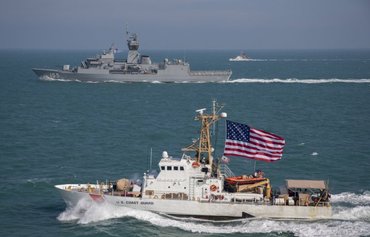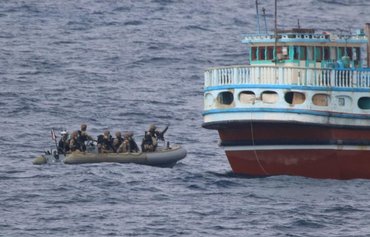Royal Australian Navy Frigate HMAS Ballarat has made another significant seizure in the Middle East, after conducting a boarding of a vessel in international waters in the Arabian Sea in late June.
HMAS Ballarat, which is taking part in Operation Manitou under the Combined Maritime Forces (CMF), discovered and seized illicit cargo on the vessel, including nearly half a million rounds of small arms ammunition, and 697 bags of chemical fertiliser, according to Australia's Defence Force.
The fertiliser has possible dual use for the manufacture of improvised explosives.
HMAS Ballarat has safely disposed of the seized items and resumed routine tasking.
![HMAS Ballarat seized nearly half a million rounds of small arms ammunition and 697 bags of chemical fertiliser during a boarding of a vessel in international waters in the Arabian Sea in late June 2019. [Photo courtesy of the Australian Defence Force]](/cnmi_am/images/2019/07/10/18879-ballarat-seizure-arms-600_384.jpg)
HMAS Ballarat seized nearly half a million rounds of small arms ammunition and 697 bags of chemical fertiliser during a boarding of a vessel in international waters in the Arabian Sea in late June 2019. [Photo courtesy of the Australian Defence Force]
The frigate has conducted 38 boardings since deploying to the Middle East on Operation Manitou in November 2018. It is scheduled to conclude its mission in July.
During this time, the crew of HMAS Ballarat has stopped illegal narcotics in excess of AUD$1 billion from funding terrorism and other illegal activity.
Between June 2nd and 5th, the frigate seized four illicit drug shipments while conducting routine searches in the Arabian Sea.
The drug seizures included a large quantity of hashish and illegal narcotics weighing a combined total of 5.8 tonnes.
The suspicious vessels were believed to be engaging in illegal activity when HMAS Ballarat conducted the boardings under the authority of the Combined Task Force 150.
HMAS Ballarat Commanding Officer, Commander Paul Johnson said the routine boardings were essential to achieving maritime security in the region.
"Our goal is to disrupt the sources of funding for terrorism and deny the narcotics trade in the Middle East," he said.
"In support of the Combined Maritime Forces, we aggressively pursued a number of vessels, which had shown signs of smuggling illegal narcotics," he said.
"The team has been working hard to track, intercept and board these vessels in some difficult conditions," said Johnson.
'Safety valve' for the region, world
Many countries are taking part in monitoring and securing maritime areas stretching from the Arabian Sea and Gulf of Aden in the northern Indian Ocean to the Mediterranean Sea under the command of the CMF, said retired UAE army officer Abdullah al-Ameri.
The multinational naval vessels and their soldiers serve as a "safety valve for Middle Eastern and Gulf countries in particular, and for the world in general", he told Al-Mashareq.
The intersection of international maritime routes in these regions requires protection against pirate attacks and any security threat that intercontinental merchant vessels may come under, he said.
These waterways are also a "major conduit for drug smugglers from around the world", said al-Ameri.
"Keeping these areas trouble-free yields positive results for the international community," he said.
The conduct of patrols and seizure of narcotics in the Arabian Sea by HMAS Ballarat yields positive results "not only for the region in which the operations took place but also for many countries that would otherwise be vulnerable to the proliferation of drugs", said al-Ameri.
HMAS Ballarat equipped with advance technology
Scouring waters and coasts in search of smugglers is no longer done the same way as in the past when manual searches for smugglers and reliance on available intelligence was the norm, said Col. Rashid Mohammed al-Marri, formerly of the Dubai Police Anti-Narcotics Department.
Now, advanced technology is used, "such as sonar frequency detection of boats and equipment that measures the boat’s water displacement and compares it to the data submitted to the Coast Guard", he told Al-Mashareq.
"The Arabian Sea is one of the most difficult to navigate and smugglers choose it for this reason as the difficulty of navigation impedes pursuit and boarding operations," he added.
HMAS Ballarat is equipped with the technologies necessary to carry out its missions in a region that is one of the most complex in the world, said al-Marri, in addition to its skilled crew, which is essential for the success of its missions.
Cutting off terror funding
Most of the proceeds from drug smuggling operations pour into the coffers of terrorist groups who use the money to fund operations around the world, said strategy analyst Maj. Gen. Yahya Mohammed Ali.
Terror groups focus on smuggling illegal drugs and heroine because they bring in a high profit margin with a fast turnaround, he told Al-Mashareq.
The smuggling of other contraband, including guns, does the same thing, he said, adding that it generates profit for gangs specialized in smuggling, including terrorist groups.
Putting an end to these smuggling operations is "vital to the overall counter-terrorism effort and will significantly cripple the capabilities of terror groups", Ali said.

![Members of the Royal Australian Navy frigate HMAS Ballarat remove bags containing suspected narcotics during a search of a suspicious dhow in the Arabian Sea in early June 2019. [Photo courtesy of the Australian Defence Force]](/cnmi_am/images/2019/07/10/18708-HMAS-Ballarat-navy-600_384.jpg)





